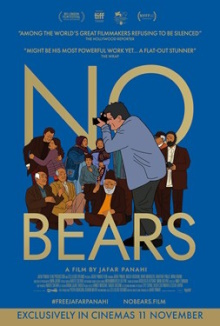Banned from making films in Iran and barred from leaving the country, director Jafar Panahi is up to his usual tricks again. Here he purports to be remotely directing a film that takes place in Turkey while being holed up in a small village near the border. It’s a brilliant premise that is clearly inspired by his real life troubles but it would be silly to believe that any of this were actually real. Panahi’s films are usually rather mild in tone even as they are rebuking the Iranian authorities. This one therefore marks a notable departure with how grim and dark it is, reflecting the worsening outlook for freedom in the country.
In Turkey, an Iranian couple has an argument over the wife Zara getting a stolen passport to let her go to Europe. Her husband Bakhtiar encourages her to go, saying that he will follow later, and this upsets her. However this is actually a scene for a film that Jafar Panahi is directing over a remote video connection. He has rented a room in the remote village of Jaban near the border but struggles with the poor Internet connection there. While taking photos in the village, he becomes inadvertently embroiled in a local dispute. The villagers claim he has taken a photo of a couple sitting together under a tree. However the young woman is promised to another man according to the village’s traditions. The aggrieved man demands the photo as proof of the couple’s wrongdoing. Meanwhile Panahi’s assistant director offers him a chance to sneak over the border to Turkey to participate in the shoot more directly and he struggles over whether to accept.
It’s a little irritating that Panahi keeps wanting to play games about what’s real and what’s not. Obviously everything is scripted in advance and the only thing real is Panahi’s own situation and the scenarios shown here may have been inspired by real people. That said, it’s an effective way to tie the theme of oppression together: Panahi’s own lack of freedom to make films and travel abroad, Bakhtiar and Zara wanting a better future for themselves in Europe, the couple in the village wanting to follow their heart to be together and so on. It isn’t just the Iranian government that is holding them back either. The title of the film refers to an illusory threat invented by the villager elders to scare people into complying with the local rules while in reality there are no bears. Similarly Panahi is advised that going to a specific swear house to swear an oath that he doesn’t have the photo in question is enough to get him out of trouble. He is even told straight out that he can even lie while swearing, it’s just important to carry out the proper, prescribed forms of the ritual. I love how Panahi directly targets old-fashioned, ridiculous traditions as a form of oppression instead of treating them as cute or picturesque. In the village, children at birth are deemed by the elders to be married off to specific people, so the girl’s umbilical cord is cut for another boy as she has no say in it whatsoever.
Compared to Panahi’s older films, the vitriol that he expresses for Iran and its people is shocking. When he goes to the border, the Turkish town on the other side with its sea of brilliant lights looks like a beacon of prosperity compared to the Iranian side. We even see him in a state of near panic as he realizes the consequences of being caught by the authorities while trying to illegally cross the border. In the village, he is appreciative and respectful towards the mother of his host who cooks his meals, but doesn’t hold back in his disdain towards the repressive traditions of the village itself. Given the period when this film was made, it’s easy to understand why. It wasn’t just Panahi himself who was in trouble. This took place against the backdrop of a mass uprising led by women against the government which was crushed only by the brutal use of force. It feels to me that through this film, he is expressing how he has lost all hope for the country that he had previously shown so much love for.
This is a great film and an unexpectedly dark one for the director. I do think that his insistence on pretending that everything is real and the scenes aren’t scripted is increasingly untenable. It’s undeniably effective in that the audience is naturally inclined to sympathize with Panahi himself given what we know of his legal troubles. Yet it also makes every film by him be about him which is starting to seem ridiculous.

One thought on “No Bears (2022)”